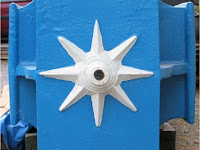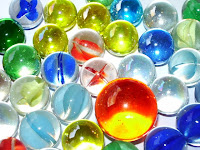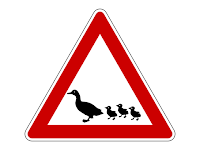philly.com, Jul. 29, 2009
Several Web sites offer guides to helping kids learn about money & math
- Jumpstart Coalition, a national personal finance coalition, www.jumpstart.org, has free and low-cost resources to teach financial education searchable by topic and age. The Michigan branch is at mijumpstartcoalition.org
- The National Endowment for Financial Education's Web site aims at improving the financial literacy of middle and high school students. It offers information for teachers and parents as well. www.hsfpp.nefe.org
- The Canadian Foundation for Economic Education created a site for youth, parents and teachers in English and French: www.moneyandyouth.cfee.org.
- Young Investor teaches young people about investing. www.younginvestor.com
- The Girl Scouts of America offers workshops and a Web site, Money Smarts, www.girlscouts.org/moneysmarts.
- Young Money is aimed at older teens, college students and young adults. www.youngmoney.com
- The Stock Market Game makes learning fun by helping kids invest a large hypothetical amount of money. www.smg2000.org/index.html
- Junior Achievement Student Center has a section, run by the Goldman Sachs Foundation, to help students learn about money management: www.ja.org/studentcenter
- Money Matters for Kids, an online curriculum at www.moneymatters4kids.com.
- The Credit Union National Association offers a program to help preschoolers called Thrive By 5. Available in both Spanish and English, it's at www.creditunion.coop/thriveby5
Read more...
7/25/2009
Kids learn science by digging in the dirt
The Wenatchee world, July 24, 2009
How do you teach young kids science? Let them dig in the dirt.
That's Jody Marquardt's technique. Marquardt is education coordinator for the Barn Beach Reserve in Leavenworth, where 14 first- through fifth-graders were enrolled in Adventures in Art and Science camps this week.
"We're looking for worms, centipedes, millipedes, cockroaches, beetles, spiders and ants," she told her troop of the camp's four youngest explorers Thursday. "Use your trowel to turn over bricks and pine needles because you don't know what you're going to find under there."
Bugs were scarce in the very dry soil beneath the pines on Reserve property along the Wenatchee River. But a little digging exposed some tiny critters that scrambled for cover. Read more...
How do you teach young kids science? Let them dig in the dirt.
That's Jody Marquardt's technique. Marquardt is education coordinator for the Barn Beach Reserve in Leavenworth, where 14 first- through fifth-graders were enrolled in Adventures in Art and Science camps this week.
"We're looking for worms, centipedes, millipedes, cockroaches, beetles, spiders and ants," she told her troop of the camp's four youngest explorers Thursday. "Use your trowel to turn over bricks and pine needles because you don't know what you're going to find under there."
Bugs were scarce in the very dry soil beneath the pines on Reserve property along the Wenatchee River. But a little digging exposed some tiny critters that scrambled for cover. Read more...
7/19/2009
The Secret to Better Grades
sfgate.com, July 16, 2009
When you see the latest spelling bee champ crowned on TV, or hear about a kid earning a perfect score on the SATs, you probably assume the winner studies all day ... or is just a born genius. In fact, there's usually something else at work. These kids, with their parents'help, have unlocked the secrets to being supermotivated students. They like to study, they like to achieve -- and they know how to get results. Here, they spill their best strategies to help your children love learning and excel in school (and their future careers).
Sharpen Their School Skills
High-achieving kids don't forget when term papers are due or arrive at an advanced math class without a calculator. These kids have learned good organizational skills, often thanks to their parents. And they've learned what study habits work best for them. Read more...
When you see the latest spelling bee champ crowned on TV, or hear about a kid earning a perfect score on the SATs, you probably assume the winner studies all day ... or is just a born genius. In fact, there's usually something else at work. These kids, with their parents'help, have unlocked the secrets to being supermotivated students. They like to study, they like to achieve -- and they know how to get results. Here, they spill their best strategies to help your children love learning and excel in school (and their future careers).
Sharpen Their School Skills
High-achieving kids don't forget when term papers are due or arrive at an advanced math class without a calculator. These kids have learned good organizational skills, often thanks to their parents. And they've learned what study habits work best for them. Read more...
Money Skills for Your Kids: Ages 4 to 9
moneywatch.bnet.com, Jul 15, 2009
Stephen Levine, of Washington, is 4 years old and hasn’t learned how to count. But he knows all about setting long-term financial goals. He and his parents put change into a milk carton, and when the coins reach the black marker line, Stephen knows he’s going to buy something — and it’s going to be good.
“It’s very elementary, but it’s not the end of his financial education. It’s the beginning,” says his mom, Laura Levine of the JumpStart Coalition for Financial Literacy, about her effort to teach her preschooler personal finance.
Parents and educators agree that kids start learning about money at an early age. So if you want your children to grow up financially savvy, start teaching them simple money lessons around age 4, and then gradually add to their knowledge as they get older. Read more...
Stephen Levine, of Washington, is 4 years old and hasn’t learned how to count. But he knows all about setting long-term financial goals. He and his parents put change into a milk carton, and when the coins reach the black marker line, Stephen knows he’s going to buy something — and it’s going to be good.
“It’s very elementary, but it’s not the end of his financial education. It’s the beginning,” says his mom, Laura Levine of the JumpStart Coalition for Financial Literacy, about her effort to teach her preschooler personal finance.
Parents and educators agree that kids start learning about money at an early age. So if you want your children to grow up financially savvy, start teaching them simple money lessons around age 4, and then gradually add to their knowledge as they get older. Read more...
7/14/2009
Study - 'Thin' Kids Get Better Grades in School

New York Post, July 14, 2009
Physically fit elementary- and middle-school students perform better academically than their out-of-shape classmates, according to a new city study.
The report found that students who placed in the top third of the school system's fitness scale had higher math and reading scores on average than students in the bottom third.
In particular, the kids who rated among the top 5 percent for fitness -- on measures that included strength and aerobic capacity -- scored an average of 36 percentage points higher on state reading and math tests in 2007-08 than did the least-fit 5 percent. Read more...
7/05/2009
New study recommends starting math in preschool

kare11.com, 3, July, 2009
WASHINGTON -- The National Research Council, a well-respected group of academics based in Washington, D.C., says preschoolers have been taught their ABCs, but not enough focus is placed on teaching them the 1-2-3s.
Four-year-old Jacob can count to 100. His classmates are writing and grouping numbers.
Basic concepts that experts say children need well before they enter kindergarten.
"The longer you wait, the more chances you're going to have that they're going to fall through the cracks" says teacher Michael Helling.
The National Research Council finds kids ages 3 to 6 are already learning numbers and geometry through everyday experiences.
"When we're going outside we're lining up and then we're all going to count. Count how many friends we have," says teacher Anuschka Boekhoudt.
"They're learning addition and subtraction but they don't really realize it you know. It's just, it's fun for them," adds Helling.
The report says kids are ready to learn. It's preschool teachers who need more math training. Read more...
7/02/2009
Kids stir up some fun in the kitchen

delawareonline.com, JUNE 30, 2009
Now that the kids are out of school for the summer they will be looking for something fun to do. Why not get them into the kitchen? The kitchen can be a great place to stir up some fun while teaching your kids science, math, and healthy eating habits.
All ages should learn the importance of good hand washing and it's never too early to start teaching kids about cooking. If your child is a fussy eater, cooking is a good way to get them to try new foods. Many times, they will be more likely to eat the meal if they've made it themselves. Read more...
7/01/2009
Poptropica - a virtual online world for kids
Poptropica is a virtual online world in which kids can travel, play games, math, customize their character, compete in head-to-head competition, and communicate safely with each other.
To play with the virtual world, you should choose a character by selecting gender, age, skin color, hair color and clothes.
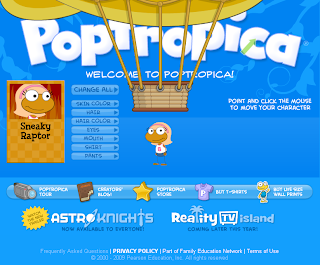
After you have created the character, you can take a hot air balloon to different island by clicking on the map of poptropica.

Let's explore the island with fun!
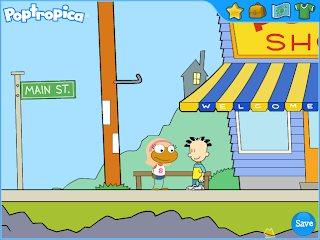
To play with the virtual world, you should choose a character by selecting gender, age, skin color, hair color and clothes.

After you have created the character, you can take a hot air balloon to different island by clicking on the map of poptropica.

Let's explore the island with fun!

6/25/2009
Golf helps kids instill drive to succeed

sfgate.com, June 24, 2009
Visitacion Valley Middle School is building a driving range. When it's finished this fall, along with a chipping area and a putting green, it will be the first of its kind in the country - a golf facility in an urban schoolyard.
The amenities, along with clubs and other related equipment, will be offered free to kids and their families in the Visitacion Valley and Bayview neighborhoods. The construction is the next stage in a program that started in the community four years ago, teaching children how to play golf, and teaching them some important life skills along the way.
"Golf gives these kids access to a decent life that they otherwise would not have," said Frank "Sandy" Tatum, chairman of the San Francisco chapter of the First Tee, an outreach program that's building the golf facilities at Visitacion Valley.
"It's a slow-paced game and it seems like not that much happens. You mostly don't see young people playing golf. Usually it's a lot of rich, elderly people," said 12-year-old Kevin Kirksey.
Golf has taught him to be patient, he said, and to focus on the problem at hand. "I used to get mad at math every single day," Kevin said. "I'm getting better, though." Read more...
6/23/2009
Free Math Video for Kids
Want to keep your kids' mind active during this summer? Here's a very good site for you! Khan Academy, a non-profit organization that provide hundreds of video for you. Kids can learn math easily from these videos.
These video include from basic Addition to Pre-algebra, Calculus and Statistics. Have fun with this site!
These video include from basic Addition to Pre-algebra, Calculus and Statistics. Have fun with this site!
6/19/2009
Scientists capture the first image of memories being made
The ability to learn and to establish new memories is essential to our daily existence and identity; enabling us to navigate through the world. A new study by researchers at the Montreal Neurological Institute and Hospital (The Neuro), McGill University and University of California, Los Angeles has captured an image for the first time of a mechanism, specifically protein translation, which underlies long-term memory formation. The finding provides the first visual evidence that when a new memory is formed new proteins are made locally at the synapse - the connection between nerve cells - increasing the strength of the synaptic connection and reinforcing the memory. The study published in Science, is important for understanding how memory traces are created and the ability to monitor it in real time will allow a detailed understanding of how memories are formed. Read more...
6/17/2009
Motivate your kids to love science
Motivate your kids to take an interest in science with these simple games and activities you can do at home.
6/12/2009
Bridging the gap between math, real world
MercuryNews.com 06/11/2009 01:34:35 PM PDT
"Otis! Otis! Otis!"
The repeating chant rings out from Lincoln Park where Otis and Edison elementary school fifth graders compete in a toothpick bridge building contest. The students gathered at the park with their tiny, wooden structures to test which construction team of five — an architect, accountant, a project director, transportation chief and carpenter — created the strongest bridge. This round goes to Otis Elementary.
"We are engaged in the 'destruction load testing' phase of our toothpick bridge building contest to see how much weight each structure can bear before it fails," said Glenn Aitkens, seven-year teacher at Edison Elementary School. "This is primarily a hands-on math and science enrichment project, but there are elements of art, design and engineering involved as well. Read more...
"Otis! Otis! Otis!"
The repeating chant rings out from Lincoln Park where Otis and Edison elementary school fifth graders compete in a toothpick bridge building contest. The students gathered at the park with their tiny, wooden structures to test which construction team of five — an architect, accountant, a project director, transportation chief and carpenter — created the strongest bridge. This round goes to Otis Elementary.
"We are engaged in the 'destruction load testing' phase of our toothpick bridge building contest to see how much weight each structure can bear before it fails," said Glenn Aitkens, seven-year teacher at Edison Elementary School. "This is primarily a hands-on math and science enrichment project, but there are elements of art, design and engineering involved as well. Read more...
6/11/2009
Adopt national standards to help children compete
Officials in 46 states and the District of Columbia agreed June 1 to move toward uniform learning goals in reading and mathematics for children nationwide. The effort, led by the National Governors Association and the Council of Chief State School Officers, was applauded by U.S. Secretary of Education Arne Duncan.
Sadly, science was left out, and education leaders in Texas — along with Alaska, Missouri and South Carolina — have so far declined to support the plan. Read more...
Sadly, science was left out, and education leaders in Texas — along with Alaska, Missouri and South Carolina — have so far declined to support the plan. Read more...
6/09/2009
KidZui, a free web browser for kids
KidZui is a free web browser, search engine and online playground for kids 3-12.
Over 2 million kid-friendly games, websites, pictures, and YouTube videos reviewed by parents and teachers anywhere. Kids can find what they need to help with schoolwork, by themselves.
For Parents, they can know what their kids are doing online and they can connect by sharing content. KidZui will sends a weekly email about kids' online activities.
To install the KidZui Browser, you can download as a windows application or a firefox Add-on.
After the installation, you can launch KidZui by Start->Program, or open firefox and click the "K" to play!
to play!
Once you are at the welcome screen, you can create your kid's account by click "Sign Up" button.

1.Choose a start Zui.

2.Pick a name and a password for your Zui.


3.Set up your kid's age

4.Input parent's email

5.Login KidZui and have fun!


Over 2 million kid-friendly games, websites, pictures, and YouTube videos reviewed by parents and teachers anywhere. Kids can find what they need to help with schoolwork, by themselves.
For Parents, they can know what their kids are doing online and they can connect by sharing content. KidZui will sends a weekly email about kids' online activities.
To install the KidZui Browser, you can download as a windows application or a firefox Add-on.
After the installation, you can launch KidZui by Start->Program, or open firefox and click the "K"
 to play!
to play! Once you are at the welcome screen, you can create your kid's account by click "Sign Up" button.

1.Choose a start Zui.

2.Pick a name and a password for your Zui.


3.Set up your kid's age

4.Input parent's email

5.Login KidZui and have fun!


6/07/2009
State math exam scores have risen - but it's because tests have gotten easier
nydailynews.com Sunday, June 7th 2009, 4:00 AM
It's the state exam version of grade inflation.
Soaring scores on the state math test don't necessarily add up to better schools or smarter kids.
That's because it has gotten easier to teach to the test as the questions have gotten easier to predict, a Daily News analysis revealed.
And, the tests may also be easier.
"It's the lesson of the financial crisis, and it's the lesson here - you can't just trust the numbers, you have to look at what the numbers mean," said Columbia University sociology doctorate student Jennifer Jennings. Read more...
It's the state exam version of grade inflation.
Soaring scores on the state math test don't necessarily add up to better schools or smarter kids.
That's because it has gotten easier to teach to the test as the questions have gotten easier to predict, a Daily News analysis revealed.
And, the tests may also be easier.
"It's the lesson of the financial crisis, and it's the lesson here - you can't just trust the numbers, you have to look at what the numbers mean," said Columbia University sociology doctorate student Jennifer Jennings. Read more...
6/01/2009
Iraq-born teen cracks maths puzzle
A 16-year-old Iraqi immigrant living in Sweden has cracked a maths puzzle that has stumped experts for more than 300 years, Swedish media reported on Thursday.
In just four months, Mohamed Altoumaimi has found a formula to explain and simplify the so-called Bernoulli numbers, a sequence of calculations named after the 17th century Swiss mathematician Jacob Bernoulli, the Dagens Nyheter daily said. Read more...
In just four months, Mohamed Altoumaimi has found a formula to explain and simplify the so-called Bernoulli numbers, a sequence of calculations named after the 17th century Swiss mathematician Jacob Bernoulli, the Dagens Nyheter daily said. Read more...
5/28/2009
Combine fun, learning to keep kids' minds active during summer
Yipee! It's almost summer vacation. But even when school is out, learning still will be very much in. Summer vacation, educators say, is no time for parents to let their kids forget about academics.
Research has shown that if you don't keep your child's brain working during this interlude, she could lose, on average, 2.6 months of grade-level equivalency in math skills and as much as a year's reading level. Read more...
Research has shown that if you don't keep your child's brain working during this interlude, she could lose, on average, 2.6 months of grade-level equivalency in math skills and as much as a year's reading level. Read more...
5/23/2009
Kids who learn math skills early have lasting advantage
| Two Wilfrid Laurier University professors have found that when parents play with their young children, they hardly spend any time teaching them about amounts and numbers. Yet if parents knew how to talk about math concepts, they’d give their children an advantage that would last all through their school years. Read more... |
Kids Math: Understand Shapes (Part 3)
Kids Math: Understand Shapes (Part 2)
Ok, this is part 2 for understanding shapes - polygon, which is a plane figure bounded by straight edges. For example, a polygon with five sides and five angles called pentagon.
Let's begin to learn polygon shapes!
Pentagon: A polygon with five sides and five angles

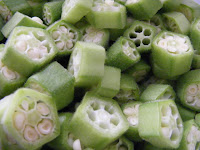


Hexagon: A polygon with six sides and six angles

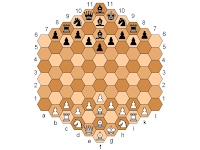


Heptagon: A polygon with seven sides and seven angles




Octagon: A polygon with eight sides and eight angles




Let's begin to learn polygon shapes!
Pentagon: A polygon with five sides and five angles




Hexagon: A polygon with six sides and six angles




Heptagon: A polygon with seven sides and seven angles




Octagon: A polygon with eight sides and eight angles




Kids Math: Understand Shapes (Part 1)
Subscribe to:
Posts (Atom)




